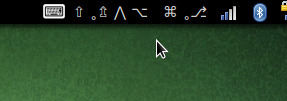问题描述
我是一名 KDE 用户,正在考虑迁移到 Unity。由于无法手动操作,我使用 sticky keys,并且在 KDE 中,我的系统面板中有一个小程序,它显示哪些修改键处于活动状态。我记得Gnome也有这个功能,Windows和OS X也有。
如何将键盘修改器状态小程序添加到 Unity 面板中?
澄清:我已经启用了粘滞键。我问如何添加一个指示修饰键状态的小程序。该指示器将显示何时按下 Shift 键、何时按下 Alt 键、何时按下 Tux 键以及何时按下 Ctrl 键。该小程序存在于所有主要桌面环境(KDE、Windows、Mac OSX 和 Gnome)中。这是桌面可访问性所必需的。
这是键盘修改器状态小程序的图像,位于键盘布局指示器小程序旁边。所表示的修饰符从左到右为 Shift 、 Ctrl 、 Alt 、 I-dont-know-this-one 、 Tux/Win 、 NumLock 和 CapsLock 。可以看到 NumLock 键处于活动状态。

最佳答案
这是 Unity 中的一个突出问题:
-
lp#773078 Should display the StickyKeys status in some way (a11y)
-
lp#1306584 No keyboard state applet in Unity(感谢@dotancohen)
下面的代码已经更新,现在可以使用图标来显示状态。但有时它可能会变慢,因为我必须更新硬盘上的图标文件,然后再次重新加载。 (请参阅 libappindicator 中有关此问题/限制的注释)
webupd8 ppa 上提供了一个打包良好的版本(感谢 Alin Andrei /Andrew/)
sudo add-apt-repository ppa:nilarimogard/webupd8
sudo apt-get update
sudo apt-get install indicator-xkbmod
参考:Keyboard Modifiers State indicator For Ubuntu: Xkbmod Indicator
原答案:
这并不是该问题的规范答案。这可以算作一种变通办法。希望有人为其编写复杂的解决方案。
这是一个简单的 Unity 键盘修饰符原型原型。
图片从左开始:图标、Shift、锁定大写、Ctrl、Alt、Super、锁定 AltGr\n(小圆圈表示锁定状态)

源文件unity-xkbmod.c:
/*
* unity-xkbmod.c
*
* Copyright 2014 Sneetsher <sneetsher@localhost>
*
* This program is free software; you can redistribute it and/or modify
* it under the terms of the GNU General Public License as published by
* the Free Software Foundation; either version 2 of the License, or
* (at your option) any later version.
*
* This program is distributed in the hope that it will be useful,
* but WITHOUT ANY WARRANTY; without even the implied warranty of
* MERCHANTABILITY or FITNESS FOR A PARTICULAR PURPOSE. See the
* GNU General Public License for more details.
*
* You should have received a copy of the GNU General Public License
* along with this program; if not, write to the Free Software
* Foundation, Inc., 51 Franklin Street, Fifth Floor, Boston,
* MA 02110-1301, USA.
*
*
*/
#include <string.h>
#include <X11/XKBlib.h>
#include <glib/gprintf.h>
#include <gtk/gtk.h>
#include <libappindicator/app-indicator.h>
//callback data structure
typedef struct _AppData {
Display *_display;
int *_deviceId;
AppIndicator *indicator;
} AppData;
//menu ui
static GtkActionEntry entries[] = {
{ "Quit", "application-exit", "_Quit", "<control>Q",
"Exit the application", G_CALLBACK (gtk_main_quit) },
};
static guint n_entries = G_N_ELEMENTS (entries);
static const gchar *ui_info =
"<ui>"
" <popup name='IndicatorPopup'>"
" <menuitem action='Quit' />"
" </popup>"
"</ui>";
//callback function, get xkb state, update indicator label (icon have limitation)
static gboolean update_xkb_state (gpointer data)
{
//get xkb state
XkbStateRec xkbState;
XkbGetState(((AppData*) data)->_display, *(((AppData*) data)->_deviceId), &xkbState);
//construct label
GString *label = g_string_new("");
register int i;
unsigned bit;
//loop taken from xkbwatch source
for (i = XkbNumModifiers - 1, bit = 0x80; i >= 0; i--, bit >>= 1)
{
//printf("base%d %s ", i, (xkbState.base_mods & bit) ? "on " : "off");
//printf("latched%d %s ", i, (xkbState.latched_mods & bit) ? "on " : "off");
//printf("locked%d %s ", i, (xkbState.locked_mods & bit) ? "on " : "off");
//printf("effective%d %s ", i, (xkbState.mods & bit) ? "on " : "off");
//printf("compat%d %s\n", i, (xkbState.compat_state & bit) ? "on " : "off");
//todo: change constant with xkb modifier constant (defined in the headers)
// show effective modifier stat
switch (i)
{
case 7:
g_string_prepend (label, ((xkbState.mods & bit) ? "⎇" : ""));
break;
case 6:
g_string_prepend (label, ((xkbState.mods & bit) ? "⌘" : ""));
break;
case 5:
g_string_prepend (label, ((xkbState.mods & bit) ? "5" : ""));
break;
case 4:
g_string_prepend (label, ((xkbState.mods & bit) ? "①" : ""));
break;
case 3:
g_string_prepend (label, ((xkbState.mods & bit) ? "⌥" : ""));
break;
case 2:
g_string_prepend (label, ((xkbState.mods & bit) ? "⋀" : ""));
break;
case 1:
g_string_prepend (label, ((xkbState.mods & bit) ? "⇬" : ""));
break;
case 0:
g_string_prepend (label, ((xkbState.mods & bit) ? "⇧" : ""));
break;
default:
break;
};
// show if modifier is locked
g_string_prepend (label, ((xkbState.locked_mods & bit) ? " ˳" : " "));
}
//g_string_prepend (label, "");
app_indicator_set_label (((AppData*) data)->indicator, label->str, NULL);
//g_free(label);
return TRUE;
}
int main (int argc, char **argv)
{
AppData appdata;
Display *_display;
int _deviceId;
char* displayName = strdup("");
int eventCode;
int errorReturn;
int major = XkbMajorVersion;
int minor = XkbMinorVersion;;
int reasonReturn;
AppIndicator *indicator;
GtkWidget *indicator_menu;
GtkUIManager *uim;
GtkActionGroup *action_group;
GError *error = NULL;
gtk_init (&argc, &argv);
XkbIgnoreExtension(False);
g_printf("Xkb client lib ver: %d.%d\n" , major , minor );
_display = XkbOpenDisplay(displayName, &eventCode, &errorReturn,
&major, &minor, &reasonReturn);
g_printf("Xkb server lib ver: %d.%d\n" , major , minor );
if (reasonReturn != XkbOD_Success)
{
g_printf("Unable to open display!\n");
return 1;
}
XkbDescRec* kbdDescPtr = XkbAllocKeyboard();
if (kbdDescPtr == NULL)
{
g_printf ("Failed to get keyboard description.\n");
return 2;
}
kbdDescPtr->dpy = _display;
_deviceId = kbdDescPtr->device_spec;
/*
//no need for event listener, used gtk_timeout timer
XkbSelectEventDetails(_display, XkbUseCoreKbd, XkbStateNotify,
XkbAllStateComponentsMask, XkbGroupStateMask);
*/
action_group = gtk_action_group_new ("AppActions");
gtk_action_group_add_actions (action_group, entries, n_entries, NULL);
indicator = app_indicator_new_with_path (
"Simple XKB Modifier Indicator",
"icon",
APP_INDICATOR_CATEGORY_HARDWARE,
g_get_current_dir());
uim = gtk_ui_manager_new ();
gtk_ui_manager_insert_action_group (uim, action_group, 0);
if (!gtk_ui_manager_add_ui_from_string (uim, ui_info, -1, &error))
{
g_printf ("Failed to build menus: %s\n", error->message);
g_error_free (error);
error = NULL;
return 3;
}
indicator_menu = gtk_ui_manager_get_widget (uim, "/ui/IndicatorPopup");
app_indicator_set_menu (indicator, GTK_MENU (indicator_menu));
app_indicator_set_status (indicator, APP_INDICATOR_STATUS_ACTIVE);
//app_indicator_set_label (indicator, " ⇧ ⋀ ⌥ ⎇ ⌘ ", NULL);
//symbols: shift U21E7 ctrl U22C0 alt/altgr U2325 U2387 cmd U2318
//from font: DejaVu Sans
appdata._display = _display;
appdata._deviceId = &_deviceId;
appdata.indicator = indicator;
gtk_timeout_add (120, (GtkFunction) update_xkb_state, &appdata);
//nice for realtime tasks, to replace gtk_timeout
//gtk_idle_add ((GtkFunction) idle_func, &appdata);
gtk_main ();
XCloseDisplay (_display);
return 0;
}
-
安装所需的标头/库:(不确定我是否错过了任何)
\n
sudo apt-get install libx11-dev libappindicator-dev libgtk2.0-dev\n -
编译:
\n
gcc -Wall unity-xkbmod.c -o unity-xkbmod `pkg-config --cflags --libs appindicator-0.1` -lX11\n -
跑步:
\n
./unity-xkbmod\n
笔记:
-
用于 Unity 指示器的
libappindicator缺少一个重要功能,无法轻松移植其他桌面指示器。 See Bug #812067 \nAPI needed: pixbuf icon setting support \n如果没有此功能,假设我们需要(Shift、Ctrl、Alt、AltGr、Super)且粘滞键处于活动状态;每个状态都有 3 个主要状态(关闭、打开/锁定、锁定)。因此应该生成 3^5 个组合图标。 (正常情况下只有 3×5 单个图标)\n这就是为什么我使用带有 DejaVu Sans 字体符号的指示标签。 -
要放置图标,请将其放在同一文件夹中并将其命名为
icon.*。接受的格式:png、svg、ico、xpm …\n如果您不喜欢任何图标,只需创建一个 1×1 px 图像即可。
参考:
-
xkbwatch&的来源plasma-widget-kbstate
